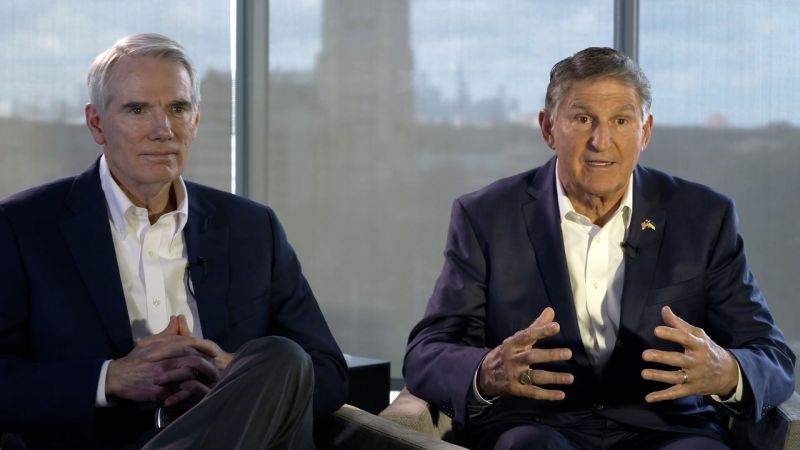Retiring Democratic Sen. Joe Manchin of West Virginia and former Sen. Rob Portman, an Ohio Republican, have refused to throw their support behind their parties’ presidential nominees, expressing concerns about stalled legislation in Congress. Both Manchin and Portman avoided directly answering questions about whether they would vote for President Joe Biden or former President Donald Trump, but made it clear they will not support the opposing party’s candidate. Manchin cited Biden’s shift towards progressive policies as a reason for his hesitation in endorsing the president.
Manchin, known for being a centrist who has clashed with members of his own party, has criticized Biden for moving too far to the left. He announced last year that he will not seek reelection, diminishing Democrats’ chances of maintaining control of the Senate. Additionally, Manchin blamed Biden for the border crisis, stating that the president bears some responsibility for the situation. Both Manchin and Portman agreed that the lack of willingness among some GOP members to compromise and pass a bipartisan border security bill has exacerbated the crisis.
Senate Republicans blocked a bipartisan border deal in early February, including aid for Ukraine and Israel, due to opposition from top House Republicans and Trump. Portman and Manchin urged members of both parties to come together to address the issue, calling out Republicans who walked away from the deal. Portman believed the deal was imperfect but a step in the right direction for the country. He suggested that the missed opportunity could make it challenging to secure enough votes in the future to address the crisis effectively.
Manchin and Portman also criticized the move to impeach Homeland Security Secretary Alejandro Mayorkas, with the former becoming the first cabinet member to be impeached in almost 150 years. The two men expressed concerns about the dysfunctional state of the current Congress, with Portman describing it as “dysfunctional” and Manchin stating that every member should be ashamed of the legislative gridlock. Both lawmakers emphasized the need for compromise and lamented the lack of willingness among their colleagues to reach agreements on important legislation.
Both Manchin and Portman, known for their ability to negotiate bipartisan deals, voiced concerns about the potential consequences of ending the filibuster, which requires 60 votes to pass a measure. Manchin fears that eliminating the filibuster would eliminate the middle ground in Congress, causing legislation to swing between the extremes of the left and the right. Portman emphasized the importance of lawmakers being willing to come to the middle to find solutions to problems, regardless of their political ideology. Both men agreed that the ability to find common ground and solve problems is essential in the current political climate.
In conclusion, Manchin and Portman’s refusal to endorse their parties’ presidential nominees highlights the current challenges facing Congress due to partisan gridlock. Both lawmakers emphasized the need for bipartisan cooperation and compromise to address key issues such as the border crisis. They expressed concerns about the dysfunction in Congress and warned against the potential consequences of eliminating the filibuster. Manchin and Portman’s calls for greater collaboration and problem-solving reflect a growing sentiment among moderate lawmakers that finding common ground is essential for the functioning of the legislative branch.


